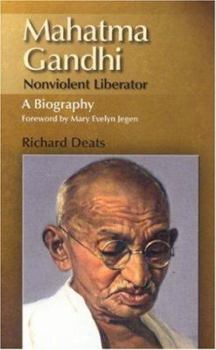Mahatma Gandhi: Nonviolent Liberator; A Biography
concise biography with section of writings This description may be from another edition of this product.
Format:Paperback
Language:English
ISBN:1565482174
ISBN13:9781565482173
Release Date:February 2005
Publisher:New City Press
Length:136 Pages
Weight:0.45 lbs.
Dimensions:0.1" x 5.5" x 8.6"
Customer Reviews
1 rating
Mahatma Gandhi, Nonviolent Liberator: A Biography - Review
Published by Thriftbooks.com User , 17 years ago
Richard Deats' biography on Mahatma Gandhi, Mahatma Gandhi, Nonviolent Liberator: A Biography, is a well organized chronicling of Mohandas Gandhi's life from his early years as an aspiring lawyer to his death as an international symbol for nonviolent movements and peace. Deats concisely summarizes Gandhi's life: As he founded several groups and movements Ghandi coined the term "satyagraha" (loosely translated as "nonviolent resistance") in one major movement, which he spearheaded against an ordinance that would require all Indian immigrants to be fingerprinted and registered. This movement provoked a huge following, and Gandhi's message began spreading like wild-fire. During this first satyagraha, Gandhi was imprisoned for the first time (one of many sacrifices he made for his causes) by South African general Christiaan Smuts for two months, during which time he made sandals for Smuts - an overwhelming act of love. Gandhi lead a second satyagraha against the fingerprint ordinance, and again a third one against a bill that would invalidate Indian marriages. The attention that these movements received managed to win over increasing numbers of Europeans as well as people from all races and religions around the world. Gandhi after 21 years in South Africa, returned to India where he continued to gain a huge following. In India, Gandhi made it a point to abolish the old Hindu cast system, which treated the lowest class, "the untouchables" as social outcasts. Also, Gandhi was an international icon in his involvement with attempting to bring peace between Hindu and Muslim Indians. Gandhi also continued to resist unjust English policies such as England's declared monopoly on salt production. In defiance of this declaration he lead his famous Salt March, where protesters produced their own salt from the waters of the Arabian Sea. English troops retaliated violently and beat the protesters. Deats refers to a quote from Louis Fischer - another great biographer of Gandhi - regarding this event. Fischer writes, "When the Indians allowed themselves to be beaten with batons and rifle butts and did not cringe they showed that England was powerless and India invincible. The rest was merely a matter of time." (65) Gandhi was winning the war for independence through purely nonviolent means. His methods of resistance often included fasting for several days. This method worked on several occasions to bring opposing parties to negotiate, including in protesting against the treatment of "the untouchables", and protesting against the Muslim-Hindu conflict. An extremist Hindu militant on January 30th of 1948 assassinated Gandhi shortly after completing a fast in protest of the violent Hindu-Muslim conflict. He had infuriated many Hindus who considered him a traitor for being sympathetic to Muslims. Gandhi left a great legacy, and his message of compassion and nonviolent resistance has clearly had a large effect on several nonviolent movements since his death.






